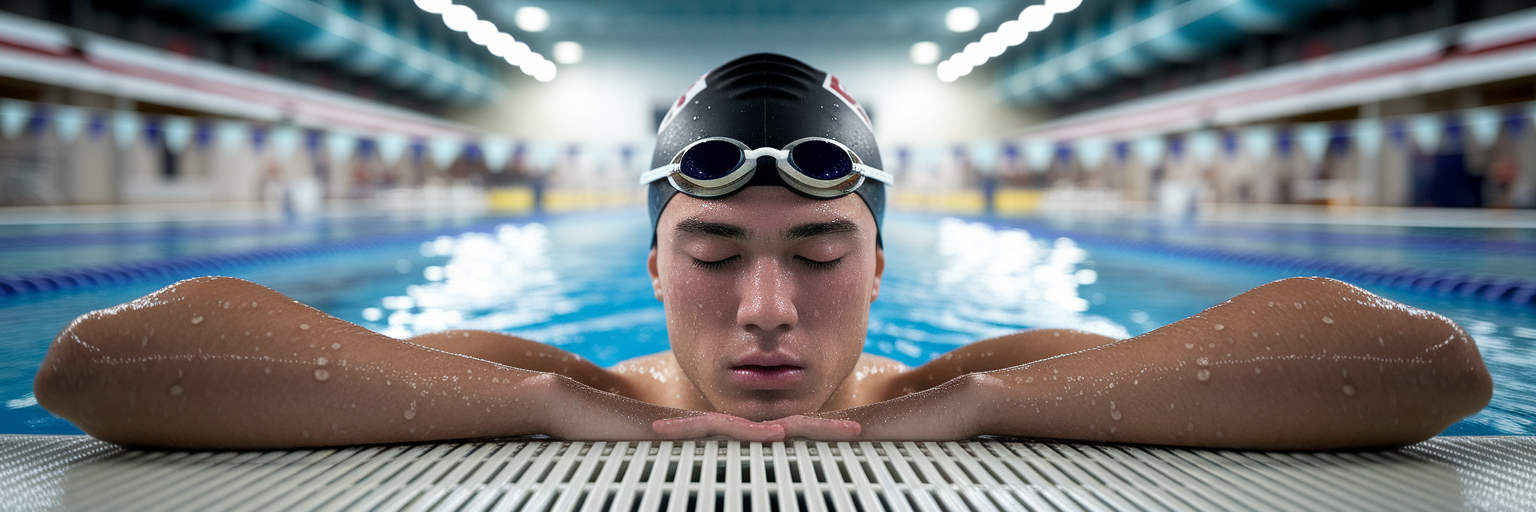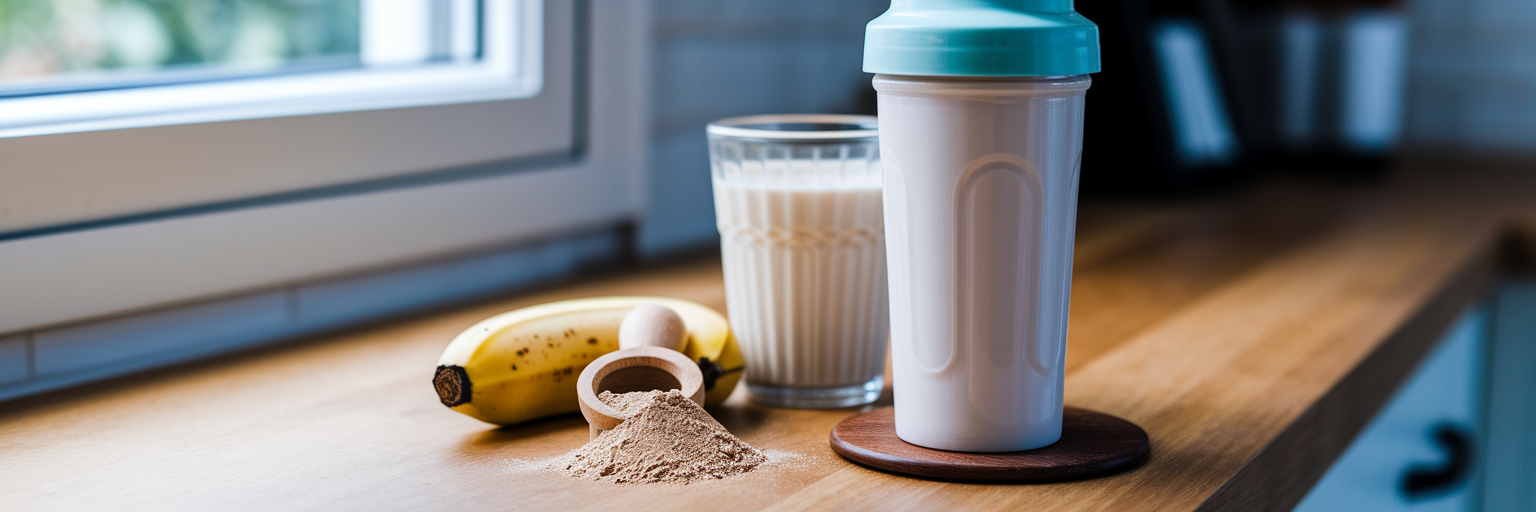The Intense Recovery Demands of Swimmers
An hour of vigorous swimming can burn a surprising amount of energy, sometimes over 700 calories. This places an immense demand on the body that many athletes underestimate. Unlike other sports that target specific muscle groups, swimming is a unique full-body workout. Think of it as performing a resistance workout for your arms, legs, back, and core all at once, with every single stroke.
This constant resistance from the water creates significant micro-tears in your muscle fibers. At the same time, your body rapidly burns through its glycogen stores, which are the primary fuel source for your muscles. Without proper replenishment, this physical toll can lead to nagging issues like swimmer's shoulder or the dreaded overtraining syndrome, where you feel constantly fatigued and your performance plateaus.
The key to avoiding this is understanding that your recovery starts the moment you get out of the pool. Your body enters what is often called the "anabolic window", a critical 15 to 30 minute period where your muscles are exceptionally receptive to nutrients. Getting your swimmer nutrition for recovery right during this window is essential for repairing muscle and refueling for your next session. It sets the stage for consistent progress and helps you feel ready to get back in the water.
How Protein Accelerates Muscle Repair

So, you’ve just finished a tough set and your muscles are feeling it. What happens next? This is where protein steps in. Protein is composed of amino acids, which are essentially the building blocks your body uses to repair those tiny muscle tears we just talked about. Supplying your body with protein right after a swim helps kickstart this repair process.
One of the most immediate benefits you’ll notice is a reduction in Delayed Onset Muscle Soreness, or DOMS. That’s the muscle ache that typically shows up a day or two after a hard workout. By accelerating repair, protein helps you bounce back faster, so you can return to the pool feeling strong instead of stiff.
But how much protein do swimmers need? A good guideline for endurance athletes is to aim for 1.2 to 1.7 grams of protein per kilogram of body weight each day. For a 150-pound swimmer (about 68 kg), that’s roughly 82 to 116 grams of protein spread throughout the day. To make it even clearer, here’s a simple chart:
| Swimmer Weight | Light Training (1.2g/kg) | Moderate Training (1.5g/kg) | Intense Training (1.7g/kg) |
|---|---|---|---|
| 120 lbs (54 kg) | ~65g | ~81g | ~92g |
| 150 lbs (68 kg) | ~82g | ~102g | ~116g |
| 180 lbs (82 kg) | ~98g | ~123g | ~139g |
| 210 lbs (95 kg) | ~114g | ~143g | ~162g |
Note: These calculations are estimates to guide daily intake. Your personal needs may vary based on specific training volume, age, and individual metabolic rate.
For muscle synthesis to be effective, it’s important to consume a "complete protein" that contains all nine essential amino acids your body can't produce on its own. This concept is key to understanding why certain protein sources are so effective. While protein is crucial for repair, other compounds support energy production, and you can explore more on our blog.
The Advantage of Plant-Based Protein for Athletes
There’s a common myth that plant-based proteins are "incomplete" and therefore less effective for serious athletes. Let's clear that up. While many individual plant sources might not contain all nine essential amino acids, combining them creates a powerful and complete amino acid profile. This is why many of the best vegan protein for athletes powders use a blend of sources to ensure full-spectrum plant-based muscle recovery.
Here are a few popular plant-based powerhouses:
- Pea Protein: A fantastic source of Branched-Chain Amino Acids (BCAAs), which are particularly important for stimulating muscle building.
- Brown Rice Protein: Known for being hypoallergenic and very easy on the digestive system, making it a great choice for athletes with sensitive stomachs.
- Soy Protein: One of the few plant sources that is a complete protein all on its own.
- Hemp Protein: Offers a healthy dose of fiber and omega-3 fatty acids in addition to its protein content.
Many swimmers find that plant-based proteins are gentler on their digestion, leading to less bloating compared to some dairy-based options. Plus, choosing plant-based is a great way to reduce your environmental footprint. But does it work for performance? Absolutely. A 2021 study in the journal Nutrients concluded that vegan diets can support athletic performance without issue when planned correctly. Finding the right supplement is a personal journey, and you can see our full range of some of the best protein powders available to help you decide.
Perfecting Your Post-Swim Recovery Shake

Now for the fun part: putting it all together. Crafting the perfect post-swim recovery shake is simple, and it’s one of the most effective tools in your nutritional toolkit. Here’s a quick guide to get you started:
- Time It Right: Remember that 15-30 minute "anabolic window" after your swim? Aim to have your shake during this time for maximum absorption and impact.
- Get the Dose: A single 30g scoop of a quality powder like our Chocolate Vegan Protein provides an excellent foundation for muscle repair.
- Add Your Carbs: This step is non-negotiable. Carbs are essential for replenishing your depleted glycogen stores. The insulin response from carbs also helps shuttle those protein-building amino acids into your muscles more efficiently. A banana, a handful of berries, or a scoop of oats are all fantastic additions.
- Mix It Up: For the quickest absorption, mix your powder with water. If you prefer a creamier texture and a few extra calories, a plant-based milk like almond or oat milk works beautifully.
Think of this shake as a powerful recovery tool that complements a balanced diet of whole foods. It’s not a replacement for a good meal, but it’s the perfect first step to kickstart your recovery. Once you have the basics down, feel free to get creative. You can even try one of these 3 easy vegan protein recipes you'll actually crave for more inspiration.
How to Choose a High-Quality Vegan Protein Powder
With so many options out there, how do you pick the right one? Becoming a smart consumer is the final step in optimizing your recovery. The best vegan protein for swimmers is one that is clean, effective, and that you actually enjoy using. Here’s what to look for:
- Check the Protein Ratio: Look at the serving size versus the grams of protein. A high protein-to-serving-size ratio means you’re getting more protein and fewer fillers.
- Demand a Clean Label: Your protein powder should have simple, recognizable ingredients. Choose products free from artificial sweeteners like aspartame and sucralose, as well as artificial colors and unnecessary additives. Natural sweeteners like stevia or monk fruit are much better alternatives.
- Prioritize Third-Party Testing: For competitive athletes, this is crucial. Certifications like NSF Certified for Sport® guarantee that a product is free from banned substances and that what’s on the label is what’s in the tub.
- Find Your Favorite: Taste and mixability matter. If you don’t like how it tastes, you won’t use it consistently. Read reviews and consider starting with a smaller container to find a flavor and texture you love.
Remember, a protein powder should supplement a healthy diet. As the Mayo Clinic suggests, a healthy diet relies on getting protein from a variety of sources like legumes, nuts, and whole grains. Your powder should complement that foundation. Ready to find the perfect fuel for your recovery? Explore our complete collection of clean, plant-based supplements.



